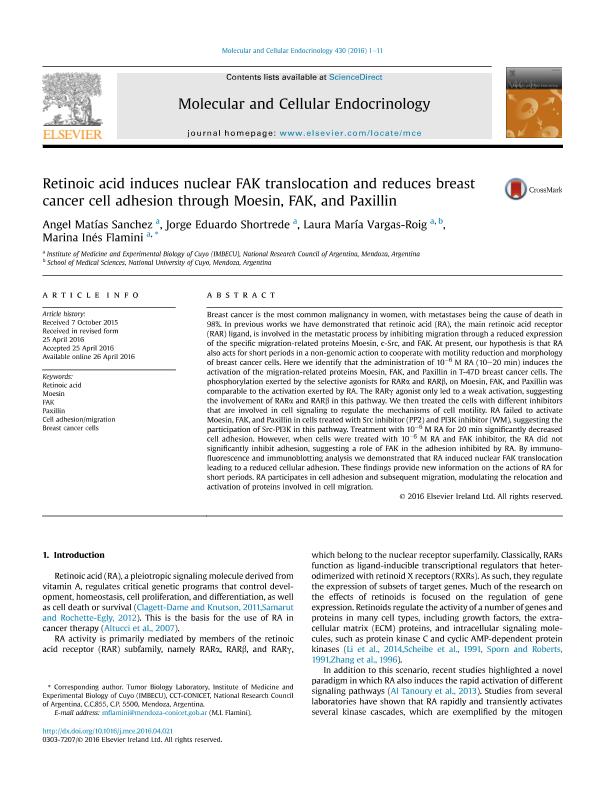Artículo
Retinoic acid induces nuclear FAK translocation and reduces breast cancer cell adhesion through Moesin, FAK, and Paxillin
Fecha de publicación:
15/07/2016
Editorial:
Elsevier Ireland
Revista:
Molecular and Cellular Endocrinology
ISSN:
0303-7207
Idioma:
Inglés
Tipo de recurso:
Artículo publicado
Clasificación temática:
Resumen
Breast cancer is the most common malignancy in women, with metastases being the cause of death in 98%. In previous works we have demonstrated that retinoic acid (RA), the main retinoic acid receptor (RAR) ligand, is involved in the metastatic process by inhibiting migration through a reduced expression of the specific migration-related proteins Moesin, c-Src, and FAK. At present, our hypothesis is that RA also acts for short periods in a non-genomic action to cooperate with motility reduction and morphology of breast cancer cells. Here we identify that the administration of 10-6 M RA (10-20 min) induces the activation of the migration-related proteins Moesin, FAK, and Paxillin in T-47D breast cancer cells. The phosphorylation exerted by the selective agonists for RARα and RARβ, on Moesin, FAK, and Paxillin was comparable to the activation exerted by RA. The RARγ agonist only led to a weak activation, suggesting the involvement of RARα and RARβ in this pathway. We then treated the cells with different inhibitors that are involved in cell signaling to regulate the mechanisms of cell motility. RA failed to activate Moesin, FAK, and Paxillin in cells treated with Src inhibitor (PP2) and PI3K inhibitor (WM), suggesting the participation of Src-PI3K in this pathway. Treatment with 10-6 M RA for 20 min significantly decreased cell adhesion. However, when cells were treated with 10-6 M RA and FAK inhibitor, the RA did not significantly inhibit adhesion, suggesting a role of FAK in the adhesion inhibited by RA. By immunofluorescence and immunoblotting analysis we demonstrated that RA induced nuclear FAK translocation leading to a reduced cellular adhesion. These findings provide new information on the actions of RA for short periods. RA participates in cell adhesion and subsequent migration, modulating the relocation and activation of proteins involved in cell migration.
Palabras clave:
Breast Cancer Cells
,
Cell Adhesion/Migration
,
Fak
,
Moesin
,
Paxillin
,
Retinoic Acid
Archivos asociados
Licencia
Identificadores
Colecciones
Articulos(IMBECU)
Articulos de INST. DE MEDICINA Y BIO. EXP. DE CUYO
Articulos de INST. DE MEDICINA Y BIO. EXP. DE CUYO
Citación
Sanchez, Angel Matias; Shortrede, Jorge Eduardo; Vargas Roig, Laura Maria; Flamini, Marina Ines; Retinoic acid induces nuclear FAK translocation and reduces breast cancer cell adhesion through Moesin, FAK, and Paxillin; Elsevier Ireland; Molecular and Cellular Endocrinology; 430; 15-7-2016; 1-11
Compartir
Altmétricas




